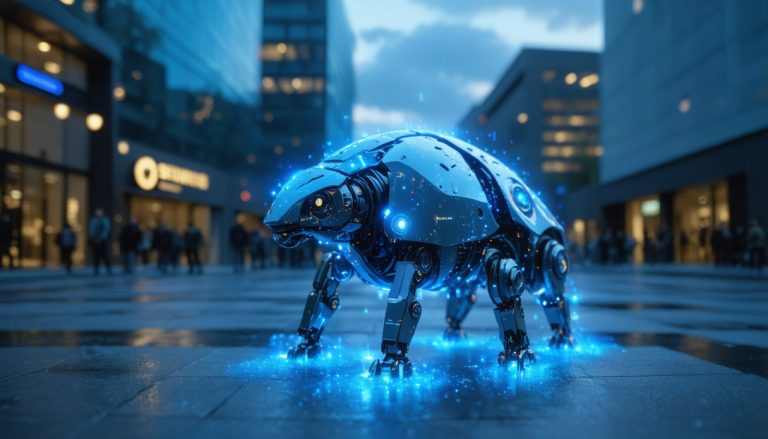
- The global landscape is at a crossroads, with outdated economic strategies clashing with rapid technological advances.
- President Trump’s tariffs aim to protect domestic industries but risk economic stagnation, contrasting with inevitable global interdependence.
- Elon Musk criticizes tariff advocate Peter Navarro, highlighting a fundamental flaw in protectionist policies against a global shift.
- The rise of AI, led by companies like OpenAI and Google, promises significant innovation but poses existential challenges for labor.
- The current administration’s reliance on antiquated economic tactics risks missing the strategic foresight needed to manage profound technological changes.
- Effective governance and global cooperation are essential to harness AI’s potential while avoiding the pitfalls of protectionism and outdated policies.
Amid the clamor of economic discourse and political maneuvering, a brewing storm threatens to redefine our world order. On one side, archaic economic strategies seek to rebuild bygone industrial legacies. On the other, a technological revolution advances with breathtaking speed, challenging our very concept of labor and productivity. At the center of this complicated juncture are President Donald Trump’s persistent tariff principles and the relentless march of Artificial Intelligence technologies poised to change everything we know about jobs and economic interdependencies.
When Elon Musk, renowned for his audacious visions of the future, targeted Trump’s tariff advocate, Peter Navarro, with a verbal salvo, he wasn’t just settling a personal score. Musk illuminated a fundamental misunderstanding at the heart of the tariff conversation. Navarro, clinging to a narrow perspective, seemed to overlook a critical truth: the natural global shift toward economic interdependence cannot be stemmed by borders or tariffs. Yet this exclusionary tactic, favoring Trump’s “America First” approach, persists in sowing economic uncertainty, hiccupping world markets, and risking a return to outdated and inefficient practices.
Tariffs are described as the bitter “medicine” of policy by some – an uncomfortable yet necessary intervention to cure purported economic ailments. However, like many dubious prescriptions, their side effects can overshadow their intended therapeutic value. While proponents like Navarro argue that tariffs will stimulate domestic industry and shield “infant” sectors, critics point out that they more often insulate inefficiency and foster economic stagnation. Historical patterns suggest these protected industries rarely thrive beyond the shield of tariffs, hinting that these policies may be little more than stopgap measures with little foresight for sustainable growth.
Meanwhile, in a juxtaposition as stark as a thunderstorm over a hushed landscape, the breathtaking acceleration of AI technology foretells an entirely different kind of upheaval. Companies like OpenAI, Anthropic, and Google are sparking a revolution, pushing the boundaries towards Artificial General Intelligence (AGI) and its more potent sibling, Artificial Superhuman Intelligence (ASI). These technologies promise innovations that could overhaul sectors ranging from healthcare to space exploration. Yet, they also pose existential questions: if machines gain the capacity to replicate and surpass human cognitive functions, what will become of jobs as we know them? What roles will humans play in economies increasingly driven by autonomy over labor?
Even as technological progress gallops forward, with machines now capable of nuanced tasks that were once firmly in the human domain, there remains a stubborn adherence to economic philosophies that feel increasingly outdated. The danger is clear: if AI progresses unbridled and unchecked, with an unprepared administration misreading the signals and mismanaging economic policy, global markets might find themselves reeling from a dual blow—one self-inflicted by outdated tariffs, the other dealt by inevitable automation.
Possibly facing the largest labor transformation since the Industrial Revolution, the current administration, led by a president known more for impulsivity than prudence, commands an unsettling paradox. At a time when nuanced understanding and strategic foresight are desperately needed to navigate such profound change, governance seems mired in anachronistic tactics reminiscent of a world long past. Compounding this challenge is the looming absence of a coherent policy to buffer the seismic shift AI heralds, as traditional roles vanish and new, unforeseen opportunities arise.
The broader lesson is stark: To truly harness AI’s potential while mitigating its risks, and to avoid the pitfalls of misguided protectionism, nations must stride forward, not retreat into isolation. Global cooperation, alongside strategic policymaking, is the only viable path to harmonize the benefits of these transformative technologies with a world seeking balance between tradition and the uncharted future. In this intricate dance between evolution and preservation, the need for leadership with both vision and adaptability has never been more crucial.
Are Tariffs and AI Creating a Perfect (Economic) Storm?
Navigating the Impact of Tariffs and AI on the Global Economy
In the midst of global economic shifting sands, two forces seem poised to significantly reshape the landscape: tariff policies and artificial intelligence (AI). As political figures, such as former President Donald Trump, emphasize protectionist measures, the question arises: do such strategies aid or hinder economic growth? Moreover, as cutting-edge AI technologies advance, what is the proper balance between innovation and job security?
The Dichotomy of Tariffs
1. Historical Context and Economic Impact: Tariffs, while historically used to protect developing industries, often lead to negative outcomes, such as trade wars or price hikes for consumers. The Smoot-Hawley Tariff of 1930 exacerbated the Great Depression, suggesting that protectionist measures can have unintended repercussions.
2. Current Trends: Many countries, in response to increasing global competition, have revisited tariff implementation. The “America First” strategy underscores this, emphasizing nationalistic economic policies.
3. Expert Opinions: Economists warn against heavy reliance on tariffs. For industries to grow sustainably outside of protective measures, innovation and efficiency are required World Economic Forum.
The AI Renaissance
1. Artificial Intelligence Growth: Companies such as OpenAI, Google, and Anthropic are pioneering AI systems with the potential to revolutionize fields like healthcare, transportation, and even creative arts.
2. Economic Disruption: AI not only threatens traditional roles but promises new opportunities. This shift demands educational systems to adapt, emphasizing skills like critical thinking and programming, which complement AI technologies.
3. Balancing Autonomy and Ethics: As AI becomes more autonomous, ethical concerns arise regarding decision-making processes and potential biases. Understanding and regulation are essential to balance these innovations with societal norms Brookings Institution.
Actionable Insights
1. How-to Steps for Adaptation:
– Embrace Lifelong Learning: Adapt by acquiring new skills. Platforms like Coursera and Khan Academy offer relevant courses in AI and automation.
– Diversify Economic Strategies: Governments should encourage varied economic policies that prioritize global cooperation.
– Foster AI Literacy: Societies should educate citizens about AI’s potential and limitations to reduce fear and promote innovation.
2. Real-World Applications:
– Industries can leverage AI for predictive analytics in healthcare or improve efficiencies in supply chains.
– Businesses can rethink their operations, incorporating AI to enhance customer interactions and optimize resources.
Looking Ahead: Predictions and Recommendations
As we look to the future, it’s clear that AI will continue to play a pivotal role in shaping economies. Likewise, tariffs require careful consideration and a nuanced approach to avoid economic fallout. Global cooperation, visionary leadership, and adaptable policies will ensure that these powerful forces lead to positive outcomes rather than discord.
Individuals, businesses, and policymakers should stay informed and proactive in understanding these dynamics. By fostering a mindset of adaptability and embracing both challenges and opportunities, we can navigate this era of rapid change to our collective benefit.
For more detailed insights and information, visit International Monetary Fund.



